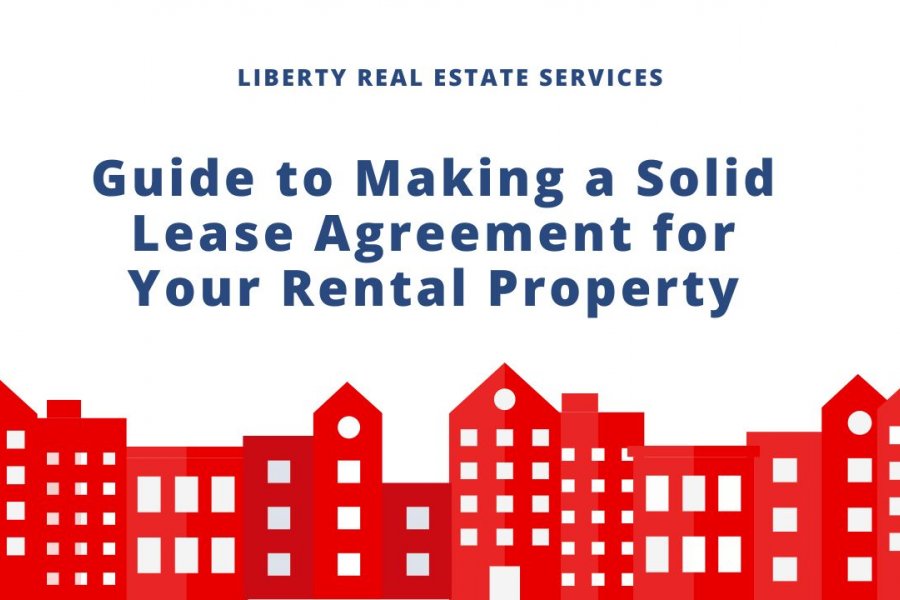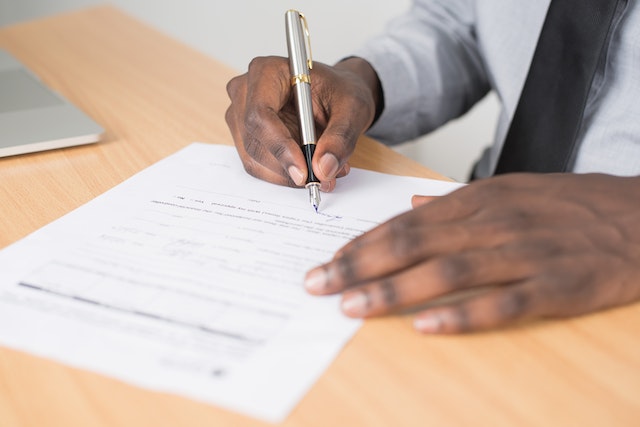
Whenever you’re renting out your property to a new tenant, it’s important to draft a written lease agreement. It should contain everything from landlord and tenant responsibilities to policies and disclosures, such as the lease term. While it can be more time-consuming, drafting a solid lease goes a long way in keeping your investment protected.
The experts at Liberty Real Estate Services have written this guide to help you draft a detailed lease agreement!
Benefits of Drafting a Solid Lease Agreement
Taking the time to make solid lease agreements has many benefits, including:
- Security - A good lease agreement can help prevent disputes. It can also serve as your protection in court.
- Time Savings - With a clear lease agreement, you won’t have to answer repetitive inquiries anymore. You’ll simply be able to refer tenants to the lease agreement for answers.
- More Stability - A solid lease agreement should include penalties for property damage and late rent. This way, you’ll have the security of knowing that your property will be well cared for, and that the monthly rent will be paid on time.
- Improved Tenant Satisfaction - Your tenants will have the security of knowing they can stay on your rental for the agreed period as long as they comply with the terms of the lease agreement.
Do You Need to Hire a Lawyer to Draft a Lease?
Lease agreements are a contract. But you don’t necessarily need to hire a lawyer to write good lease agreements, you can do it yourself.

But you’re a first-time landlord or simply don’t have the time to write a lease, you can hire a property management company to do it for you. These companies often have legal professionals on their team that specialize in property law and rights as well as drafting solid rental agreements.
How to Write a Lease Agreement
All rental properties are different so, each lease agreement will have different clauses. But the basic points every lease should have are the following:
Names
Every contract should include the full names of all the parties involved, meaning the tenants and landlord.
Description and Address of Rental Property
The full address of the property should be included in the lease agreement. If it’s an apartment or multi-family dwelling, you’ll have to include the building and unit number.
You must also specify the kind of property you’re renting out, as well as any additional information about it. This can include information about assigned parking or any rules regarding tenants not being allowed to access certain areas.
Term of the Tenancy
You can rent out your rental properties on the short term, on a month-to-month basis, or for the long term. No matter what you decide, you must include the term of the tenancy on the lease agreement, since the tenant has to respect it during their lease term. Be sure to specify the start date, tenancy length, and termination date.

Price of Rent
The price of rent should be spelled out in figures and words to avoid confusion. Apart from monthly rent amount you should specify:
- Payment methods you accept. For instance, if you only accept checks, you need to state so.
- Whether you charge any late fees. Make sure to also include the fee amount and the grace period you give on late payments.
- Additional fees. These can include pet fees and the security deposit amount.
- Rent due date. Specify the date of paying rent to avoid misunderstandings.
Mandatory Disclosures
Landlords are obliged to make certain disclosures to tenants. In Georgia, for example, landlords must disclose:
- If there’s a risk of lead-based paint on the property.
- The names and contact info of all people managing the rental.
- If the property is at risk of floods or has flooded in the past.
The best way to comply with this aspect of landlord-tenant laws is to include any mandatory disclosure in the lease agreements.
Additional Clauses and Policies
Every lease agreement will include different policies. But some basic clauses you should consider adding to your all leases are:
Subletting
You should specify whether a tenant can sublet their rental to someone else at any point. Some landlords allow it but include specific clauses about in the lease, If you’re against it, it’s best to state it clearly in the lease.
Tenant Obligations
To ensure that renters take proper care of your home, you can spell out the obligation they should fulfill. This can include basic maintenance tasks to prevent tenant damage and things like acceptable noise regulations.

Breaking of the Lease
Check out your local landlord-tenant laws and make sure to include the legal reasons for which both parties could terminate the lease early. If you’re including an early lease termination clause, then list the perimeters tenants must adhere to for it to apply.
Renewal Terms
To ensure your property is always protected, it’s a good idea to make renewal screening checks a standard practice in all your leases. Detail what the process will consist of.
Security Deposit
Renters have the right to know where you’re storing their security deposit. So, make sure to explain this on the lease. Additionally, you can include the requirements tenants should fulfill to get their full security deposit back at the end of the tenancy.
Signatures of All Parties
Finally, because it’s a written contract, your lease agreement should be signed by you and your tenants. This indicates that both parties have a clear understanding of the terms of the lease and agree to respect them.
Bottom Line
Drafting a solid lease is the most effective way to keep your property protected from liabilities. Now, you know that a solid rental agreement should include key information such as the name of the parties involved, the price of rent, the terms of the tenancy, subletting clauses, and mandatory discloses.
If you need help writing a solid lease agreement for a rental in Hinesville, GA, contact Liberty Real Estate Services! We provide full-service property management Hinesville GA solutions to help reduce property owners’ stress and maximize their ROI. Contact us today to learn more about the benefits of our services!
